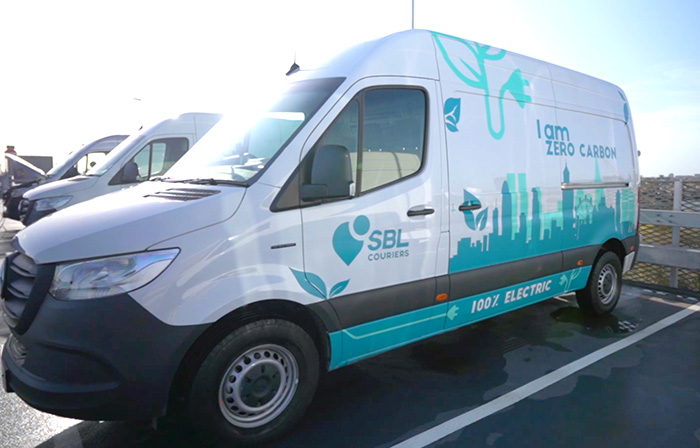London-based SBL Couriers is targeting savings of almost £5 million by switching its 600-strong van fleet to fully-electric models.
The company has already taken on more than 200 Mercedes-Benz eVito and eSprinter models, and is looking to transition its entire fleet to zero emission.
“With this one decision, we’ve already saved £1.9 million as a business,” says Jodelle Silva, CEO of SBL.
“And once we convert the entire fleet, we’re on track to save another £2.9 million – that’s almost £5 million in total.”
Although the upfront cost of EVs can be higher, Silva says the savings come through lower operating costs: electricity is generally cheaper than petrol or diesel on a per-mile basis, and the company has been consistently making savings through lower service, maintenance and repair bills as well.
All SBL drivers are sub-contractors, and he adds that 90% of the savings made by its EV fleet are passed back to our drivers, so “we end up having an unbeatable retention rate”.
Silva founded SBL in Acton in 2012 and over the past five years it has continued to grow and diversify the scope of its services.
It provides a range of same-day, overnight and nationwide services, and has grown beyond the Greater London area; its customer base now includes companies from all over the UK, such as ParcelForce and Amazon Logistics.
While the financial savings have been a huge benefit to the transition to EVs, the switch was also inspired by customers’ shifting expectations around sustainability, adds Silva.
Its clients include Parcelforce and Amazon, while in 2022 it launched a strategic initiative with delivery company DX, which initiated the use of SBL’s EVs for its London parcel deliveries.
The first phase launched with an initial 20 EVs, liveried with DX Express branding, for use in central London.
The initial electric fleet was anticipated to deliver approximately 750,000 parcels in its first full year of operation.
“We knew that our clients, particularly those who prioritise sustainability, appreciated those that make environmentally responsible choices – some even reimbursing us for business miles in a bid to push towards their own net zero goals,” says Silva.
“It certainly pays to align to customers’ values wherever possible. As a big carbon contributor, the delivery industry has to bite the bullet and do what it can to reduce its footprint.
“For us, that came in the form of an electric van overhaul. The next step will be to insure the company on an electric fleet policy; these are comparatively cheap and will enable our couriers to enjoy lower weekly expenses.”
SBL has also introduced a number of other green initiatives.
These include installing solar panels at its facilities to power the 12 EV charging stations installed at the site, as well as adopting new electric forklift trucks at its distribution centres.
“We’re looking at how we can go electric across our entire supply chain – from shipments at ports or hubs, to last-mile delivery,” says Silva.
“It’s no mean feat, but we’re committed to the task – and we’ve already made steps in the right direction.
“There’s a lot happening here at SBL and all of these different strands within the business will hopefully lead us to a point where we can set the standard for sustainability in the logistics industry.
“We want other businesses to follow suit – not just to help the planet, but to help their pockets.”





















Login to comment
Comments
No comments have been made yet.